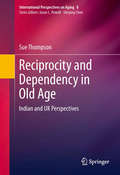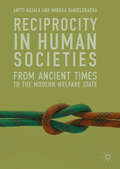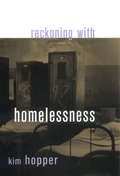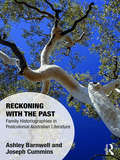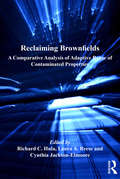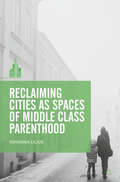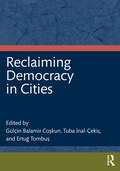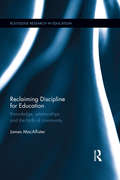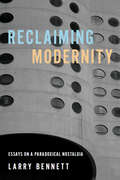- Table View
- List View
Recent Fertility Trends in Sub-Saharan Africa: Workshop Summary
by Engineering Medicine National Academies of SciencesFertility rates and population growth influence economic development. The marked declines in fertility seen in some developing nations have been accompanied by slowing population growth, which in turn provided a window of opportunity for rapid economic growth. For many sub-Saharan African nations, this window has not yet opened because fertility rates have not declined as rapidly there as elsewhere. Fertility rates in many sub-Saharan African countries are high: the total rate for the region is estimated to be 5.1 births per woman, and rates that had begun to decline in many countries in the region have stalled. High rates of fertility in these countries are likely to contribute to continued rapid population growth: the United Nations projects that the region's population will increase by 1.2 billion by 2050, the highest growth among the regions for which there are projections. In June 2015, the Committee on Population organized a workshop to explore fertility trends and the factors that have influenced them. The workshop committee was asked to explore history and trends related to fertility, proximate determinants and other influences, the status and impact of family planning programs, and prospects for further reducing fertility rates. This study will help donors, researchers, and policy makers better understand the factors that may explain the slow pace of fertility decline in this region, and develop methods to improve family planning in sub-Saharan Africa.
Recent Trends in Image Processing and Pattern Recognition: Third International Conference, RTIP2R 2020, Aurangabad, India, January 3–4, 2020, Revised Selected Papers, Part I (Communications in Computer and Information Science #1380)
by K. C. Santosh Bharti GawaliThis two-volume set constitutes the refereed proceedings of the Third International Conference on Recent Trends in Image Processing and Pattern Recognition (RTIP2R) 2020, held in Aurangabad, India, in January 2020.The 78 revised full papers presented were carefully reviewed and selected from 329 submissions. The papers are organized in topical sections in the two volumes. Part I: Computer vision and applications; Data science and machine learning; Document understanding and Recognition. Part II: Healthcare informatics and medical imaging; Image analysis and recognition; Signal processing and pattern recognition; Image and signal processing in Agriculture.
Rechte Akteure im Betrieb: Sechs EU-Länder im Vergleich
by Samuel Greef Wolfgang Schroeder Seongcheol KimDieses Buch ist die erste vergleichende Studie über rechte Kommunikations- und Organisierungsbestrebungen auf betrieblicher Ebene sowie gewerkschaftliche Gegenreaktionen. Im Rahmen eines europäischen Sechs-Länder-Vergleichs (Belgien, Deutschland, Frankreich, Italien, Polen, Ungarn), der auch eine Betriebsfallstudie für jedes Land umfasst, wird eine Klassifikation rechter Aktivitäten und gewerkschaftlicher Reaktionen herausgearbeitet. Der Band beruht auf einem in Zusammenarbeit mit Gewerkschaften durchgeführten Forschungsprojekt und damit auf einem Theorie-Praxis-Dialog zu diesem hochaktuellen Thema.
Rechter Terrorismus: international – digital – analog (Edition Rechtsextremismus)
by Anna Daun Florian Hartleb Marc Coester Christoph Kopke Vincenz LeuschnerIn westlichen Demokratien häufen sich Fälle von rechtem Terrorismus. Die innere Sicherheit und das Leben von gesellschaftlichen Minderheiten und in der Öffentlichkeit stehenden Personen werden durch vielfältige Formen schwerer Gewalttaten und Terrorakte bedroht. Begründungen für solche Akte verweisen auf althergebrachten Rechtsextremismus, Rassismus, Antisemitismus oder Autoritarismus. Ebenso zeigen sich aber auch neue Erscheinungsformen, die auf Verschwörungstheorien und Ideologieversatzstücken aufbauen. Der Band setzt sich zum Ziel, zur Erforschung des gegenwärtigen Rechtsterrorismus beizutragen. Ausgangspunkt ist die Frage, inwieweit es sich bei aktuellen, nationalen und internationalen Attentaten um „neue“ Formen des Terrorismus handelt. Dabei sollen zum einen die weltanschaulichen, strategischen, kommunikativen, praktischen und operativen Dimensionen des Terrorismus beleuchtet werden. Zum anderen soll auch gefragt werden, ob und auf welche Weise diese Erscheinungen mit trans- und internationalen politischen und gesamtgesellschaftlichen Entwicklungen zusammenhängen. Darüber hinaus stellt sich die Frage, welchen Einfluss ein gesellschaftlicher Rechtsruck mit entsprechenden menschenfeindlichen Einstellungen in der Bevölkerung und abwertender Hassrede im Internet auf dieses Phänomen hat. Insgesamt scheinen die neuen, neu konfigurierten oder modifizierten Formen rechten Terrorismus viel mit einem veränderten Verhältnis zwischen Individuum und Kollektiv, zwischen Einzeltäter und globalem Netzwerk zu tun zu haben.
Rechtliche Freiheit: Politik und Recht in der kategorialen Wahrnehmung (Politische Bildung)
by Julia NeuhofJulia Neuhof zeigt, dass Komplexität und Unübersichtlichkeit politisch-rechtlicher Entwicklungen in der modernen Gesellschaft über eine kategorial orientierte politische Bildung vermittelbar sein können. Die Voraussetzungen hierfür werden in einer qualitativen Studie zu der Wahrnehmung rechtlicher Freiheit mit Schülerinnen erfasst. So existieren thematisch vielfältige Kategorisierungen der Lernenden. Für diese lassen sich auf dem politikdidaktisch tradierten Weg kategorialer Bildung Anschlüsse an sozialwissenschaftliche Begriffe zur Deutung politisch-rechtlicher Realität schaffen. Darüber hinaus bestehen jedoch Wahrnehmungshindernisse in der kategorialen Erschließung, die neue politikdidaktische Lehr-Lern-Strategien erforderlich machen. Wie diese aussehen können, wird von der Autorin im Kontext politisch-rechtlichen Lernens vorgeschlagen.
Rechtsextreme Gewalt: Erklärungsansätze – Befunde – Kritik (essentials)
by Michail LogvinovVor dem Hintergrund steigender rechtsextremer Gewalt widmet sich dieses essential der Frage, welche Erkl#65533;rungsans#65533;tze die Rechtsextremismusforschung f#65533;r die rechte Gewaltkriminalit#65533;t erarbeitet hat. Michail Logvinov diskutiert die in den soziologischen Forschungen verbreiteten Interpretationen der Radikalisierungsprozesse im rechten Milieu und arbeitet ihre St#65533;rken und Schw#65533;chen heraus. Er bietet Definitionen der relevanten Gewaltbegriffe und Informationen zur Rolle des Kampfes als Denkfigur und Deutungsmuster im Rechtsextremismus.
Rechtsextremismus, Demokratiebildung, gesellschaftliche Integration: Interdisziplinäre Debatten und Forschungsbilanzen
by Danny Michelsen Andreas BeelmannDer Band präsentiert aktuelle Forschungsergebnisse des Zentrums für Rechtsextremismusforschung, Demokratiebildung und gesellschaftliche Integration (KomRex) der Friedrich-Schiller-Universität Jena. Im ersten Teil werden neben Analysen zum Thema Rechtsextremismus und Radikalisierung aktuelle Befunde der politischen Einstellungsforschung vorgestellt, die u. a. auf Daten des jährlich durchgeführten Thüringen-Monitors basieren. Der zweite Teil fragt nach Grundlagen für eine zeitgemäße Demokratiepädagogik und Extremismusprävention sowie nach den Voraussetzungen für eine erfolgreiche Integration von Migrant*innen.
Recipes and Songs
by Razia ParveenThis book presents a systematic approach to the literary analysis of cultural practices. Based on a postcolonial framework of diaspora, the book utilizes literary theory to investigate cultural phenomena such as food preparation and song. Razia Parveen explores various diverse themes, including the female voice, genealogy, space, time, and diaspora, and applies them to the analysis of community identity. This volume also demonstrates how a literary analysis of oral texts helps to provide insight into women's lived narratives. For example, Parveen discusses how the notion of the 'third space' creates a distinctly feminine spatiality.
Recipes for Urban Happiness: Design for Community Well-being
by Jenny DonovanThe experiences we enjoy, endure, or miss out on are influenced by what our surroundings allow and invite us to do. Just like our food diet, our experience diet influences our health and so our chances of finding happiness and fulfilling our potential. A healthy experience diet offers inspiration, reassurance, delight, and play. It nurtures physical, cognitive, and emotional health, builds resilience, and fosters confidence and self-esteem. An unhealthy experience diet lacks these things and consigns people to lives diminished in quantity and quality. Recipes for Urban Happiness offers an innovative way of looking at the relationship between people and place and redefines what good urban design is. The book outlines what designers and non-designers can do to create urban places where nurturing behaviours are both possible and preferable. Recipes for Urban Happiness will be relevant to public health, community development, and design practitioners, as well as students and academics.
Reciprocity and Dependency in Old Age
by Sue ThompsonThis book highlights (1) the significance of reciprocity for the maintenance of self-esteem in old age and (2) the negative implications for the well-being of dependent older people when that significance goes unrecognized and, as a consequence, opportunities to give back to society, as well as take from it, are not facilitated by those in a position to do so. The discussion draws on research undertaken in the UK and Southern India into the extent to which having the self-perception of being valued in the world is important to older people in receipt of care support and whether, in their experience, this is recognized by others. The author presents an analysis of theoretical insights from leading thinkers across a broad range of literature and from several disciplines, including social theory, social work, philosophy, and gerontology. The author also gives voice to the perspectives of those dependent older people not often heard because of marginalizing and disempowering processes that contribute to their having little opportunity to be heard in the first place. The emphasis of this book is on aspiration to a meaningful life and continuing personal growth as offering a challenge to dominant discourses the equate old age with decline.
Reciprocity in Human Societies: From Ancient Times to the Modern Welfare State
by Antti Kujala Mirkka DanielsbackaPresenting new insights into reciprocity, this book combines Marcel Mauss’s well-known gift theory with Barrington Moore’s idea of mutual obligations linking rulers and the ruled. Teasing out the interrelatedness of these approaches, Reciprocity in Human Societies suggests that evolutionary psychology reveals a human tendency for reciprocity and collaboration, not only in a mutually cooperative way but also through increasing retributive moral emotions. The book discusses various historical societies and the different models of the current welfare state—Nordic (social democratic), conservative, and liberal— and the repercussions of the neoliberal policies of tax havens, tax cuts, and austerity with a cross-disciplinary approach that bridges evolutionary psychology, sociology, and social anthropology with history.
Reckoning with Homelessness
by Kim Hopper"It must be some kind of experiment or something, to see how long people can live without food, without shelter, without security."--Homeless woman in Grand Central StationKim Hopper has dedicated his career to trying to address the problem of homelessness in the United States. In this powerful book, he draws upon his dual strengths as anthropologist and advocate to provide a deeper understanding of the roots of homelessness. He also investigates the complex attitudes brought to bear on the issue since his pioneering fieldwork with Ellen Baxter twenty years ago helped put homelessness on the public agenda.Beginning with his own introduction to the problem in New York, Hopper uses ethnography, literature, history, and activism to place homelessness into historical context and to trace the process by which homelessness came to be recognized as an issue. He tells the largely neglected story of homelessness among African Americans and vividly portrays various sites of public homelessness, such as airports. His accounts of life on the streets make for powerful reading.
Reckoning with the Past: Family Historiographies in Postcolonial Australian Literature (Memory Studies: Global Constellations)
by Joseph Cummins Ashley BarnwellThis is the first book to examine how Australian fiction writers draw on family histories to reckon with the nation’s colonial past. Located at the intersection of literature, history, and sociology, it explores the relationships between family storytelling, memory, and postcolonial identity. With attention to the political potential of family histories, Reckoning with the Past argues that authors’ often autobiographical works enable us to uncover, confront, and revise national mythologies. An important contribution to the emerging global conversation about multidirectional memory and the need to attend to the effects of colonisation, this book will appeal to an interdisciplinary field of scholarly readers.
Reclaiming America: Nike, Clean Air, and the New National Activism
by Randy ShawHave activists taken the bumper-sticker adage "Think Globally, Act Locally" too literally? Randy Shaw argues that they have, with destructive consequences for America. Since the 1970s, activist participation in national struggles has steadily given way to a nearly exclusive focus on local issues. America's political and corporate elite has succeeded in controlling the national agenda, while their adversaries—the citizen activists and organizations who spent decades building federal programs to reflect the country's progressive ideals—increasingly bypass national fights. The result has been not only the dismantling of hard-won federal programs but also the sabotaging of local agendas and community instituions by decisions made in the national arena.Shaw urges activists and their organizations to implement a "new national activism" by channeling energy from closely knit local groups into broader causes. Such activism enables locally oriented activists to shape America's future and work on national fights without traveling to Washington, D.C., but instead working in their own backyards. Focusing on the David and Goliath struggle between Nike and grassroots activists critical of the company's overseas labor practices, Shaw shows how national activism can rewrite the supposedly ironclad rules of the global economy by ensuring fair wages and decent living standards for workers at home and abroad. Similarly, the recent struggles for stronger clean air standards and new federal budget priorities demonstrate the potential grassroots national activism to overcome the corporate and moneyed interests that increasingly dictate America's future.Reclaiming America's final section describes how community-based nonprofit organizations, the media, and the Internet are critical resources for building national activism. Shaw declares that community-based groups can and must combine their service work with national grassroots advocacy. He also describes how activists can use public relations to win attention in today's sprawling media environment, and he details the movement-building potential of e-mail. All these resources are essential for activists and their organizations to reclaim America's progressive ideals.
Reclaiming American Virtue: The Human Rights Revolution of the 1970s
by Barbara J. KeysThe American commitment to international human rights emerged in the 1970s not as a logical outgrowth of American idealism but as a surprising response to national trauma, as Barbara Keys shows in this provocative history. Reclaiming American Virtue situates this novel enthusiasm as a reaction to the profound challenge of the Vietnam War and its tumultuous aftermath. Instead of looking inward for renewal, Americans on the right and the left alike looked outward for ways to restore America's moral leadership. Conservatives took up the language of Soviet dissidents to resuscitate a Cold War narrative that pitted a virtuous United States against the evils of communism. Liberals sought moral cleansing by dissociating the United States from foreign malefactors, spotlighting abuses such as torture in Chile, South Korea, and other right-wing allies. When Jimmy Carter in 1977 made human rights a central tenet of American foreign policy, his administration struggled to reconcile these conflicting visions. Yet liberals and conservatives both saw human rights as a way of moving from guilt to pride. Less a critique of American power than a rehabilitation of it, human rights functioned for Americans as a sleight of hand that occluded from view much of America's recent past and confined the lessons of Vietnam to narrow parameters. It would be a small step from world's judge to world's policeman, and American intervention in the name of human rights would be a cause both liberals and conservatives could embrace.
Reclaiming Brownfields: A Comparative Analysis of Adaptive Reuse of Contaminated Properties (Global Urban Studies)
by Richard C. HulaThe environmental legacy of past industrial and agricultural development can simultaneously pose serious threats to human health and impede reuse of contaminated land. The urban landscape around the world is littered with sites contaminated with a variety of toxins produced by past use. Both public and private sector actors are often reluctant to make significant investments in properties that simultaneously pose significant potential human health issues, and may demand complex and very expensive cleanups. The chapters in this volume recognize that land and water contamination are now almost universally acknowledged to be key social, economic, and political issues. How multiple societies have attempted to craft and implement public policy to deal with these issues provides the central focus of the book. The volume is unique in that it provides a global comparative perspective on brownfield policy and examples of its use in a variety of countries.
Reclaiming Cities as Spaces of Middle Class Parenthood (The Contemporary City)
by Johanna LiliusFor nearly a century families have been out-migrating to suburbs and peri-urban areas. In this book, Johanna Lilius conceptualizes the relatively recent phenomenon of families choosing to live in the inner city. Drawing on a range of qualitative data, the book offers a holistic approach to simultaneously understanding changes within parenting practices and changes connected to city development. The book explains not only why families choose to stay in the inner city and how they use the city in their everyday lives, but also how families change the landscape of contemporary cities, and how the family is, and has been, perceived in urban planning and policy-making. The Nordic perspective provided by Lilius makes this book an important contribution in helping understand inner city change outside the Anglo-American context, and will appeal to an international audience.
Reclaiming Democracy in Cities
by Gülçin Balamir Coşkun Tuba İnal-Çekiç Ertuğ TombuşEffective urban governance is essential in responding to the challenges of inequality, migration, public health, housing, security, and climate change. Reclaiming Democracy in Cities frames the city as a political actor in its own right, exploring the city’s potential to develop deliberative and participatory practices which help inform innovative democratic solutions to modern day challenges.Bringing together expertise from an international selection of scholars from various fields, this book begins with three chapters which discuss the theoretical idea of the democratic city and the real-world applicability of such a model. Part II discusses new and innovative democratic practices at the local level and asks in what way these practices help us to rethink democratic politics, institutions, and mechanisms in order to move toward a more egalitarian, pluralist, and inclusive direction. Drawing on the Istanbul municipal elections and the Kurdish municipal experience, Part III focuses on the question of whether cities and local governments can lead to the emergence of strong democratic forces that oppose authoritarian regimes. Finally, Part IV discusses urban solidarity networks and collaborations at both the local level and beyond the nation, questioning whether urban solidarity networks and alliances with civil society or transnational city networks can create alternative ways of thinking about the city as a locus of democracy.This edited volume will appeal to academics, researchers, and advanced students in the fields of urban studies, particularly those with an interest in democratic theory; local democracy; participation and municipalities. It will also be relevant for practitioners of local governments, NGOs, and advocacy groups and activists working for solidarity networks between cities.
Reclaiming Discipline for Education: Knowledge, relationships and the birth of community (Routledge Research in Education)
by James MacAllisterDiscipline is of profound educational importance, both inside educational institutions and outside of them in personal and social life. Reclaiming Discipline for Education revisits neglected philosophical ideas about discipline in education and uses these ideas to re-think practices and discourses of discipline in education today. Chapters in this book trace the evolution of thought regarding discipline in education all the way from Kant through to Durkheim, Foucault, Peters, Dewey and Macmurray. MacAllister also critically examines the strengths and weaknesses of contemporary school discipline practices in the UK, the US and Australia, including behaviour management, zero tolerance and restorative approaches. The educational credentials of psychological constructs of grit and self-discipline are also questioned. This book concludes by considering the current and future state of discipline in education on the basis of the different philosophical, practical and policy perspectives discussed. In particular, MacAllister examines why it is problematic to consider practices of discipline in isolation from the wider purposes of education. This book is suitable for an international audience and should be read by anyone who is interested in education and educational leadership, as well as those interested in the philosophy of education.
Reclaiming Food Security (Earthscan Food and Agriculture)
by Michael S. CarolanIn this challenging work, the author argues that the goal of any food system should not simply be to provide the cheapest calories possible. A secure food system is one that affords people and nations – in both the present and future – the capabilities to prosper and lead long, happy, and healthy lives. For a variety of reasons, food security has come to be synonymous with cheap calorie security. On this measure, the last fifty years have been a remarkable success. But the author shows that these cheap calories have also come at great cost, to the environment, individual and societal well-being, human health, and the food sovereignty of nations. The book begins by reviewing the concept of food security, particularly as it has been enacted within agrifood and international policy over the last century. After proposing a coherent definition the author then assesses empirically whether these policies have actually made us and the environment any better off. One of the many ways the author accomplishes this task is by introducing the Food and Human Security Index (FHSI) in an original attempt to better measure and quantify the affording qualities of food systems. A FHSI score is calculated for 126 countries based on indicators of objective and subjective well-being, nutrition, ecological sustainability, food dependency, and food system market concentration. The final FHSI ranking produces many counter-intuitive results. Why, for example, does Costa Rica top the ranking, while the United States comes in at number fifty-five? The author concludes by arguing for the need to reclaim food security by returning the concept to something akin to its original spirit, identified earlier in the book. While starting at the level of the farm the concluding chapter focuses most of its attention beyond the farm gate, recognizing that food security is more than just about issues surrounding production. For example, space is made in this chapter to address the important question of, "What can we eat if not GDP?" We need, the author contends, a thoroughly sociological rendering of food security: a position that views food security not as a thing – or an end in itself – but as a process that ought to make people and the Planet better off.
Reclaiming Humanity in Palestinian Hunger Strikes: Revolutionary Subjectivity and Decolonizing the Body
by Ashjan AjourRooted in feminist ethnography and decolonial feminist theory, this book explores the subjectivity of Palestinian hunger strikers in Israeli prisons, as shaped by resistance. Ashjan Ajour examines how these prisoners use their bodies in anti-colonial resistance; what determines this mode of radical struggle; the meanings they ascribe to their actions; and how they constitute their subjectivity while undergoing extreme bodily pain and starvation. These hunger strikes, which embody decolonisation and liberation politics, frame the post-Oslo period in the wake of the decline of the national struggle against settler-colonialism and the fragmentation of the Palestinian movement. Providing narrative and analytical insights into embodied resistance and tracing the formation of revolutionary subjectivity, the book sheds light on the participants’ views of the hunger strike, as they move beyond customary understandings of the political into the realm of the ‘spiritualisation’ of struggle. Drawing on Foucault’s conception of the technologies of the self, Fanon’s writings on anti-colonial violence, and Badiou’s militant philosophy, Ajour problematises these concepts from the vantage point of the Palestinian hunger strike.
Reclaiming Modernity: Essays on a Paradoxical Nostalgia
by Larry BennettWhy do we seek to return to the past or rescue pieces of the past that may have value in the present? Why does nostalgia attach to an approach to the world, social rules, and material products that willfully rejected the past? Larry Bennett explores the complexities of nostalgia with considerations of the historic preservation of brutalist architecture, specifically Bertrand Goldberg’s Prentice Women’s Hospital in Chicago; the memoirs and recollections of early and mid-twentieth-century Brooklyn and Detroit; and the turntable’s rebirth as a musical instrument alongside the vinyl LP’s resurgence as a prized way of consuming music. Bennett tracks modernity as expressed through ideas, artistic products, and widespread social practices. His consideration of nostalgia focuses on our inclination to rediscover value in people, places, and social habits diminished by the passage of time. Provocative and multidisciplinary, Reclaiming Modernity delves into the paradox of how we feel nostalgia for ideas and times that emerged from an impulse to shun nostalgia.
Reclaiming Reality: A Critical Introduction to Contemporary Philosophy (Classical Texts in Critical Realism (Routledge Critical Realism))
by Roy BhaskarOriginally published in 1989, Reclaiming Reality still provides the most accessible introduction to the increasingly influential multi-disciplinary and international body of thought, known as critical realism. It is designed to "underlabour" both for the sciences, especially the human sciences, and for the projects of human emancipation which such sciences may come to inform; and provides an enlightening intervention in current debates about realism and relativism, positivism and poststucturalism, modernism and postmodernism, etc. Elaborating his critical realist perspective on society, nature, science and philosophy itself, Roy Bhaskar shows how this perspective can be used to undermine currently fashionable ideologies of the Right, and at the same time, to clear the ground for a reinvigorated Left. Reclaiming Reality contains powerful critiques of some of the most important schools of thought and thinkers of recent years—from Bachelard and Feyerabend to Rorty and Habermas; and it advances novel and convincing resolutions of many traditional philosophical problems. Now with a new introduction from Mervyn Hartwig, this book continues to provide a straightforward and stimulating introduction to current debates in philosophy and social theory for the interested lay reader and student alike. Reclaiming Reality will be of particular value not only for critical realists but for all those concerned with the revitalization of the socialist emancipatory project and the renaissance of the Marxist theoretical tradition. Roy Bhaskar is the originator of the philosophy of critical realism, and the author of many acclaimed and influential works including A Realist Theory of Science, The Possibility of Naturalism, Scientific Realism and Human Emancipation and Dialectic: The Pulse of Freedom. He is an editor of the recently published Critical Realism: Essential Readings and is currently chair of the Centre for Critical Realism.
Reclaiming The Public Sphere: Communication, Power and Social Change
by Tina Askaniusi Liv Stubbe ØstergaardThis volume brings together a range of different specialists in the arts and cultural industries, as well as international academics and public intellectuals, to explore how media and communication practices for social change are currently being reconfigured in both conceptual and rhetorical terms.
Reclaiming Your Community: You Don’t Have to Move out of Your Neighborhood to Live in a Better One
by Majora CarterMajora Carter shows how brain drain cripples low-status communities and maps out a development strategy focused on talent retention to help them break out of economic stagnation. "My musical, In the Heights, explores issues of community, gentrification, identity and home, and the question: Are happy endings only ones that involve getting out of your neighborhood to achieve your dreams? In her refreshing new book, Majora Carter writes about these issues with great insight and clarity, asking us to re-examine our notions of what community development is and how we invest in the futures of our hometowns. This is an exciting conversation worth joining.” —Lin-Manuel Miranda How can we solve the problem of persistent poverty in low-status communities? Majora Carter argues that these areas need a talent-retention strategy, just like the ones companies have. Retaining homegrown talent is a critical part of creating a strong local economy that can resist gentrification. But too many people born in low-status communities measure their success by how far away from them they can get. Carter, who could have been one of them, returned to the South Bronx and devised a development strategy rooted in the conviction that these communities have the resources within themselves to succeed. She advocates measures such as • Building mixed-income instead of exclusively low-income housing to create a diverse and robust economic ecosystem • Showing homeowners how to maximize the long-term value of their property so they won't succumb to quick-cash offers from speculators • Keeping people and dollars in the community by developing vibrant “third spaces”—restaurants, bookstores, and places like Carter's own Boogie Down Grind Cafe This is a profoundly personal book. Carter writes about her brother's murder, how turning a local dumping ground into an award-winning park opened her eyes to the hidden potential in her community, her struggles as a woman of color confronting the “male and pale” real estate and nonprofit establishments, and much more. It is a powerful rethinking of poverty, economic development, and the meaning of success.









